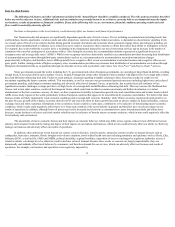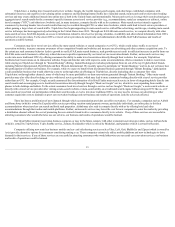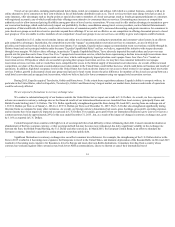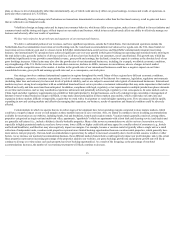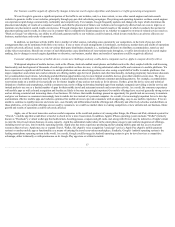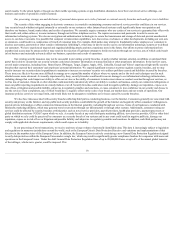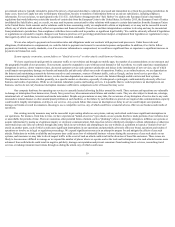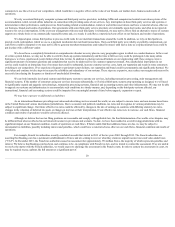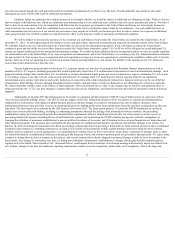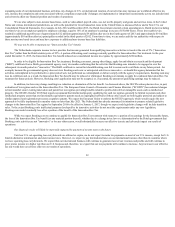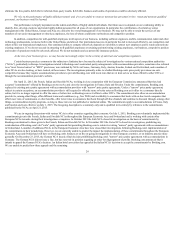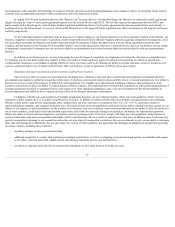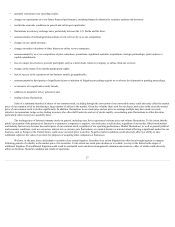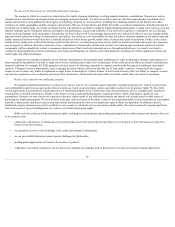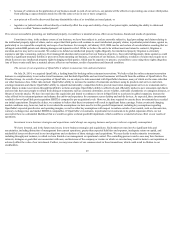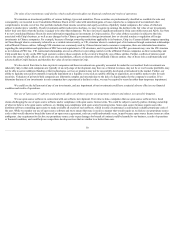Priceline 2015 Annual Report Download - page 24
Download and view the complete annual report
Please find page 24 of the 2015 Priceline annual report below. You can navigate through the pages in the report by either clicking on the pages listed below, or by using the keyword search tool below to find specific information within the annual report.
any such assessment, though any such payment would not constitute an admission by us that we owe the taxes. French authorities may decide to also audit
subsequent tax years, which could result in additional assessments.
Similarly, Italian tax authorities have initiated a process to determine whether we should be subject to additional tax obligations in Italy. While we believe
that we comply with Italian tax law, Italian tax authorities may determine that we owe additional taxes, and they may also assess penalties and interest. We believe
that we have been, and continue to be, in compliance with Italian tax law. In general, governments in the United States and Europe are increasingly focused on
ways to increase tax revenues, which has contributed to an increase in audit activity and harsher stances taken by tax authorities. Any such additional taxes or
other assessments may be in excess of our current tax provisions or may require us to modify our business practices in order to reduce our exposure to additional
taxes going forward, any of which could have a material adverse effect on our business, results of operations and financial condition.
We will be subject to increased income taxes in the event that our cash balances held outside the United States are remitted to the United States. As of
December 31, 2015 , we held approximately $9.8 billion of cash, cash equivalents, short-term investments and long-term investments outside of the United States.
We currently intend to use our cash held outside the United States to reinvest in our international operations. If our cash balances outside the United States
continue to grow and our ability to reinvest those balances outside the United States diminishes, under U.S. GAAP we will be obligated to record additional U.S.
income tax expense with respect to our unremitted international earnings. We would not make additional income tax payments unless we were to actually repatriate
our international cash to the United States. If we were to repatriate our international cash to the United States, we would pay only U.S. federal alternative minimum
tax and certain U.S. state income taxes in connection with such repatriation as long as we have net operating loss carryforwards available to offset our U.S. taxable
income. Such use of our net operating loss carryforwards would result in us being subject to a cash income tax liability on the earnings of our U.S. businesses
sooner than would otherwise have been the case.
Various legislative proposals that would reform U.S. corporate income tax laws have been proposed by President Obama's administration as well as
members of the U.S. Congress, including proposals that would significantly impact how U.S. multinational corporations are taxed on international earnings. Such
proposals include changes that would reduce U.S. tax deferral on certain international digital goods and services transactions, impose a minimum U.S. tax on non-
U.S. earnings, impose a one-time 14% tax on previously untaxed non-U.S. earnings, limit U.S. deductions for interest expense related to un-repatriated
international-source income, limit interest and royalty deductions in connection with certain related party transactions, impose restrictions on the use of hybrid
arrangements, limit shifting of income through intangible property transfers, and put in place certain tax disincentives for offshoring jobs or business segments.
We cannot determine whether some or all of these or other proposals will be enacted into law or what, if any, changes may be made to such proposals prior to
being enacted into law. If U.S. tax laws change in a manner that increases our tax obligations, our financial position and results of operations could be adversely
impacted.
Additionally, in October 2015 the Organisation for Economic Co-operation and Development ("OECD") issued "final reports" in connection with its
"base erosion and profit shifting" project. The OECD, with the support of the G20, initiated this project in 2013 in response to concerns that international tax
standards have not kept pace with changes in global business practices and that changes are needed to international tax laws to address situations where
multinational businesses may pay little or no tax in certain jurisdictions by shifting profits away from jurisdictions where the activities creating those profits may
take place. The final reports were endorsed by the G20 leaders in November 2015. The final reports propose 15 actions the OECD determined are needed to
address base erosion and profit shifting, including: (a) enhancing transparency through the sharing of tax information between countries; (b) prescribing
standardized country-by-country reporting and other documentation requirements aimed at identifying where profits, tax and economic activities occur; (c)
preventing harmful tax practices including the use of preferential tax regimes; (d) modernizing the OECD's transfer pricing rules related to intangibles; (e)
changing the definition of permanent establishment to prevent artificial avoidance of tax nexus; and (f) limiting tax base erosion through interest deductions and
other financial payments. The measures also contemplate the development of a multilateral instrument to incorporate and facilitate changes to tax treaties. On
January 28, 2016, the European Commission unveiled a new package of proposals aimed at providing a framework for fairer taxation and to provide a coordinated
European Union response to combating corporate tax avoidance. Key features of the proposals include: legally-binding measures to block the most common
methods used by companies to avoid paying taxes; a recommendation to member states on how to prevent tax treaty abuse; a proposal for member states to share
tax-related information on multinational businesses operating in the European Union; and actions to promote good tax governance internationally. We expect many
countries to change their tax laws in response to this project, and several countries have already changed or proposed changes to their tax laws in response to the
final reports. Any changes to international tax laws, including new definitions of permanent establishment or changes affecting the benefits of preferential tax
regimes such as the Dutch "Innovation Box Tax" (discussed below), could impact the tax treatment of our foreign earnings and adversely impact our effective tax
rate. Further, changes to tax laws and additional reporting requirements could increase the complexity, burden and cost of compliance. Due to the large and
21


